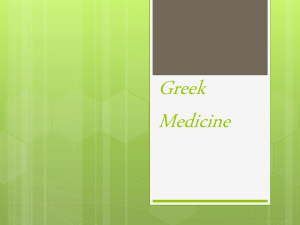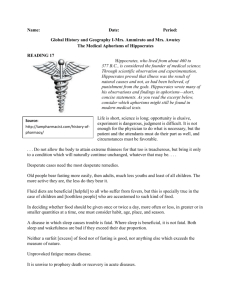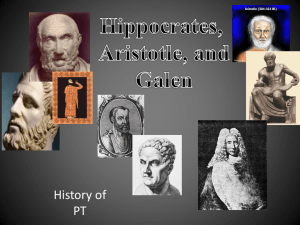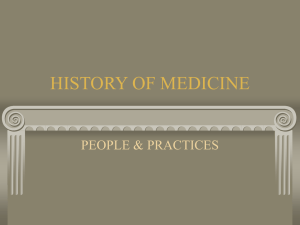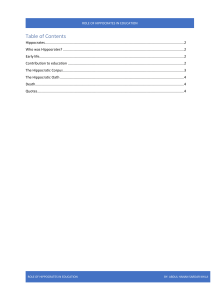Greek Medicine
advertisement
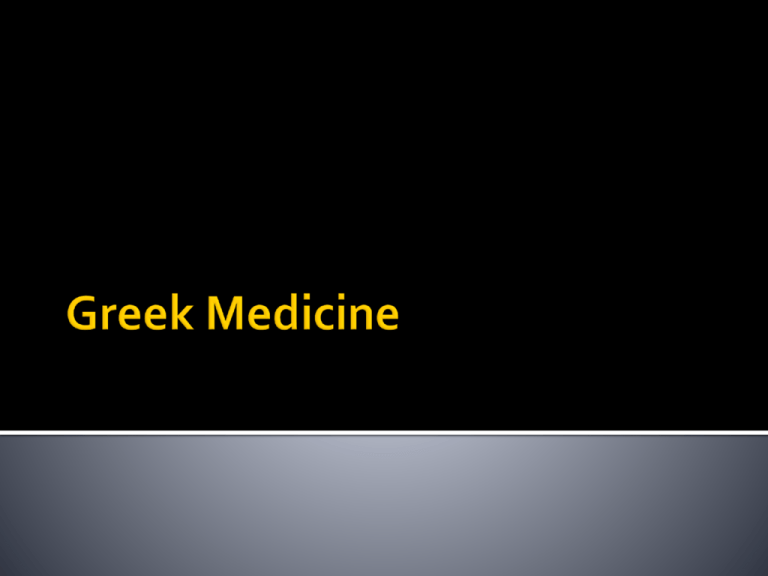
Before Hippocrates, medicine was based on myths Treatment was based on religion and rituals When Hippocrates lived, science became a more prominent role of medicine Sickness was now viewed as part of the natural world Doctors looked at diet and lifestyle instead of saying an illness was due to astrology or the gods Greek physicians became innovators of health and medicine Born in a Greek island named Cos at around 460 B.C. Cos was known for its medical school Born into a family of medical background Father and grandfather were physicians After his parents died, he traveled throughout Greece and Macedonia Learned under many great thinkers of Greece Advised many cities on how to fight diseases and plagues Later returned back to Cos to teach medicine Died in 377 BC Fig 2. Remains of Medical School in Cos Fig 1. Hippocrates Considered “father of Western medicine” Hippocrates used a scientific approach to medicine which paved the new standard of medical practice Hippocratic Corpus- collection of writings under his name Also based medicine off philosophy and was inspired by the popular philosopher group, the Pythagoreans Used the three fundamental principals of observation, experience and rationale. Cover a wide variety of topics including, general medicine, environmental medicine, treatments, theories of diseases, and remarks about human physiology Opened the idea that water and air can cause sickness, and stressed the idea of a proper diet Worked in many areas of health, and created many new ideas He introduced numerous medical terms universally used by physicians, including symptom, diagnosis, therapy, trauma and sepsis Hippocrates based the four humors from the four elements of nature (water, earth, wind and fire) The four humors are black bile, yellow bile, phlegm and blood The state of good health is reliant on a balance of all four humors Physicians must rebalance the humors for a sick patient in order to help with healing This is where Hippocrates idea of examining the patient, observing symptoms, and finding a diagnosis before treatment becomes important Today, physicians take the Hippocratic Oath before they began their medical career Set of ethical standards they swear to follow Treat fellow employees with respect Patient’s needs are a priority Never harm a patient No unprofessional relations with a patient Fig 2. Oath Symbol Hippocrates helped develop medicine to what it is today During his life, diseases and sickness became more common, so his practice of using science helped improve health care Developed professional standards Homer: • Homer was the earliest source of medical knowledge in Greece. • Within the Iliad, Homer mentions nearly 150 different wounds. • Homer also barely described the treatment of wounds. Aristotle: ▪ Was very influential because of his critical observations of natural phenomenon, and provided methods of scientific experimentation and investigation. Fig 3. Aristotle The Greeks created medical schools. As early as 500 BC, a man named Alcameon (who also discovered the optic nerve) created a medical school around the Mediterranean colonies in Greece. The Greeks discovered that the heart functioned like a pump that sent blood throughout the body. The Greeks also discovered that the brain was the center of the nervous system. D'Angour, Armand. "Ancient And Modern." History Today 62.2 (2012): 6. MasterFILE Premier Web. 18 Aug. 2013. Downey, Ed. "Hippocrates Of Cos." Hippocrates Of Cos (2006): 1. MAS Ultra - School Edition Web. 18 Aug. 2013. Emmanouil Magiorkinis, et al. "Health And Disease In Ancient Greek Medicine." International Journal Of Health Science 1.2 (2008): 32-36. Academic Search Premier. Web. 18 Aug. 2013. Falagas, M. E. "Science in Greece: From the Age of Hippocrates to the Age of the Genome." The FASEB Journal 20.12 (2006): 1946-950. Print. Magiorkinis, Emmanouil, Aristidis Diamantis, and George Androutsos. "Gods And Heroes Of Medicine In Greek Mythology." Archives: The International Journal Of Medicine 1.3 (2008): 144-147. Academic Search Premier. Web. 18 Aug. 2013. Markel, Howard. "“I Swear by Apollo” — On Taking the Hippocratic Oath." New England Journal of Medicine 350.20 (2004): 2026-029. Print. Orfanos, C. E. "From Hippocrates To Modern Medicine." Journal Of The European Academy Of Dermatology & Venereology 21.6 (2007): 852858. Academic Search Premier. Web. 18 Aug. 2013. Scarborough, John. "Hippocrates And The Hippocratic Ideal In Modern Medicine: A Review Essay." International Journal Of The Classical Tradition 9.2 (2002): 287-297. Academic Search Premier. Web. 18 Aug. 2013. Yapijakis, Christos. "Hippocrates of Kos, the Father of Clinical Medicine, and Asclepiades of Bithynia, the Father of Molecular Medicine." In Vivo 23.4 (2009): 507-14. Web. 18 Aug. 2013. <http://iv.iiarjournals.org/content/23/4/507.full>. Fig 1. Hippocrates. 1. Photograph. Health and Disease in Ancient Greek Medicine. 6th ed. Vol. 21. N.p.: n.p., n.d. 852-58. EBSCO. Web. 22 Aug. 2013. <http://web.ebscohost.com.lib.chandleraz.gov/ehost/pdfviewer/pdf viewer?vid=3&sid=e233a63c-01ef-4995-84613e70be23265a%40sessionmgr4&hid=112>. Fig 2. Kos Medical School. N.d. Photograph. Kos, Greece. Kos. Web. 22 Aug. 2013. Fig 3. The Hippocratic Symbol. 2008. Photograph. Morality in the Healthcare System. Web. 22 Aug. 2013. Fig 4. Aristotle. N.d. Photograph. Huffington Post. 27 Oct. 2012. Web. 22 Aug. 2013.
